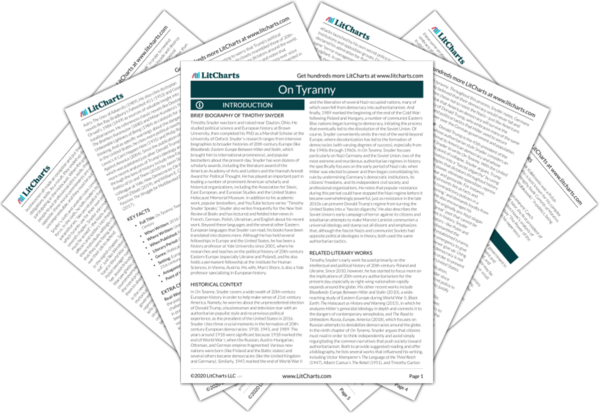Tyranny Quotes in On Tyranny
The European history of the twentieth century shows us that societies can break, democracies can fall, ethics can collapse, and ordinary men can find themselves standing over death pits with guns in their hands. It would serve us well today to understand why.
Does the history of tyranny apply to the United States? Certainly the early Americans who spoke of “eternal vigilance” would have thought so. The logic of the system they devised was to mitigate the consequences of our real imperfections, not to celebrate our imaginary perfection. We certainly face, as did the ancient Greeks, the problem of oligarchy—ever more threatening as globalization increases differences in wealth. The odd American idea that giving money to political campaigns is free speech means that the very rich have far more speech, and so in effect far more voting power, than other citizens. We believe that we have checks and balances, but have rarely faced a situation like the present, when the less popular of the two parties controls every lever of power at the federal level, as well as the majority of state houses. The party that exercises such control proposes few policies that are popular with the society at large, and several that are generally unpopular—and thus must either fear democracy or weaken it.
“What is truth?” Sometimes people ask this question because they wish to do nothing. Generic cynicism makes us feel hip and alternative even as we slip along with our fellow citizens into a morass of indifference. It is your ability to discern facts that makes you an individual, and our collective trust in common knowledge that makes us a society. The individual who investigates is also the citizen who builds. The leader who dislikes the investigators is a potential tyrant.
Modern tyranny is terror management. When the terrorist attack comes, remember that authoritarians exploit such events in order to consolidate power. The sudden disaster that requires the end of checks and balances, the dissolution of opposition parties, the suspension of freedom of expression, the right to a fair trial, and so on, is the oldest trick in the Hitlerian book. Do not fall for it.
If none of us is prepared to die for freedom, then all of us will die under tyranny.
Until recently, we Americans had convinced ourselves that there was nothing in the future but more of the same. The seemingly distant traumas of fascism, Nazism, and communism seemed to be receding into irrelevance. We allowed ourselves to accept the politics of inevitability, the sense that history could move in only one direction: toward liberal democracy. After communism in eastern Europe came to an end in 1989-91, we imbibed the myth of an “end of history.” In doing so, we lowered our defenses, constrained our imagination, and opened the way for precisely the kinds of regimes we told ourselves could never return.












